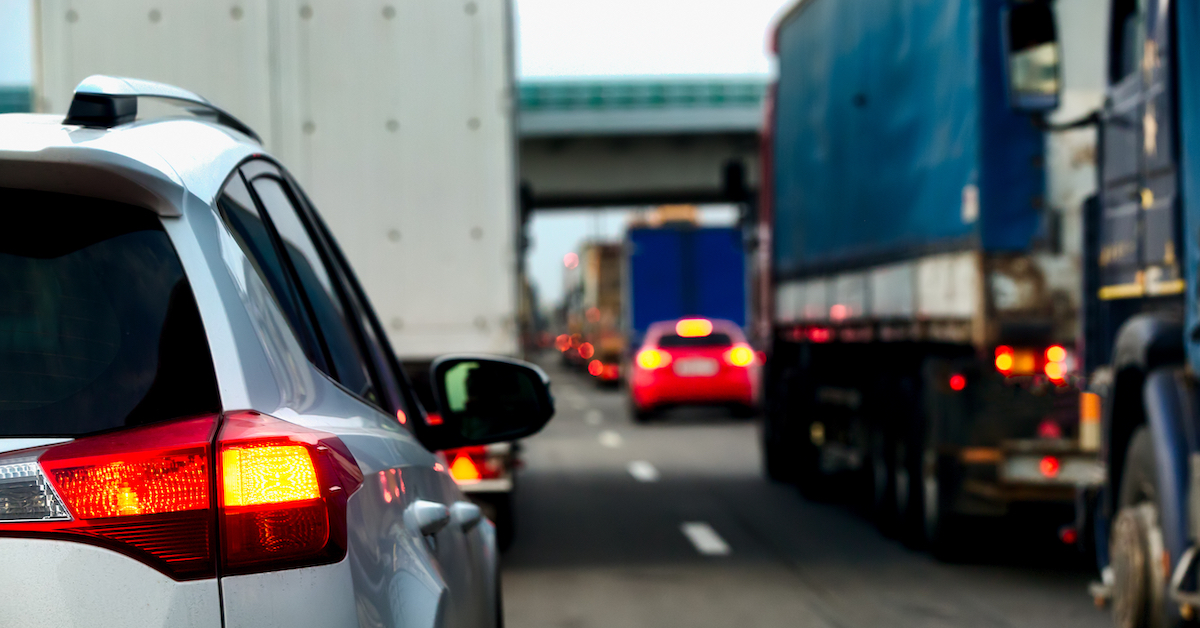
Sharing roads and highways with tractor-trailers is daunting for many drivers. Uneasiness around these commercial trucks is not misplaced, as truck accidents cause some of the most catastrophic and deadly collisions every year.
The experienced Wisconsin truck accident attorneys at Studinski Law, LLC have helped injured clients and their families recover compensation for the heavy burden of damages caused by truck accidents. We’ve seen firsthand the destruction caused by these types of crashes with commercial trucks. Below, we detail some of the most common types of truck accidents in Wisconsin.
Jackknifing occurs when the trailer portion of a large commercial truck pushes the front section of the big rig to one side or causes it to swing the entire way around, so the cab is facing backward. This shape resembles a jackknife or pocketknife. Jackknife accidents happen when the truck is out of control, such as when the front part of the vehicle attempts to skid to a stop, but the towed trailer does not stop or slow down, pushing the cab forward.
These truck accidents can be caused by improper braking, poor road or weather conditions, speeding, attempting to turn too quickly, equipment failure, inadequate maintenance, and errors by the driver caused by inexperience, poor training, fatigue, or intentional acts.
Tire blowouts cause some of the deadliest tractor-trailer accidents and occur when a tire unexpectedly deflates and comes apart, spewing the tire and debris onto the road and posing a crash risk for other drivers. The big rig may roll over or swerve into oncoming traffic if the steer tire blows out. Tire blowouts may be due to under-inflated tires, worn tires, tread burn or tread separation, manufacturing defects, and negligence. A tire blowout can happen if the driver or company has failed to properly maintain and repair the truck (including tires) or overloaded the trailer.
These truck crashes involve the truck rolling onto its side and can have fatal consequences for the driver and passenger vehicles driving by. A rollover accident may happen due to the truck driver’s inexperience or negligence. Speeding or going too fast for the load, weather conditions, or road hazards can increase the risk of a truck rollover.
Tractor-trailers are at high risk for rollover accidents because they have a high center of gravity and carry heavy cargo, including liquids. A tanker with a partial or full load of fluids can quickly lose balance from a sudden shift, such as hitting the brakes and causing the liquid to surge forward.
A head-on collision truck accident happens when the front of a large commercial truck hits the front of an oncoming motor vehicle. While these make up a smaller percentage of truck crashes, it’s estimated that 3 in 10 motor vehicle deaths were caused by head-on collisions with large trucks in 2019, leading to over 600 deaths, according to the U.S. Department of Transportation.
Head-on collisions may happen due to driver error or negligence, including distracted driving, fatigue, inexperience, poor training, lack of truck maintenance, defective vehicle parts, and overloading or improperly loading cargo.
You may feel most at risk when driving past a big rig on the highway, but the largest threat occurs when you are fast approaching a commercial vehicle from behind. While guards are attached to the back of the trailer designed to keep passenger vehicles safe, you can still become trapped and travel underneath the trailer. This dangerous scenario can cause decapitation.
The U.S. Department of Transportation estimates nearly 500 people traveling in passenger cars are killed and over 5,000 injured in rear-end collisions with commercial trucks every year.
These crashes are similar to rear-end collisions. Underride accidents occur when a smaller vehicle hits the back or side of a semi-truck, and the collision causes the car to slide underneath the tractor-trailer. These incidents are among the most fatal truck accidents because the top of the smaller car can be sheared off completely.
Underride truck accidents typically happen when the commercial truck makes a U-turn, crosses an intersection, or turns onto a street. An oncoming driver may not see the big rig or think it is moving faster. Underride accidents involve rear-end and side collision crashes and may be due to a slow-moving or parked truck with poor markings or bad road conditions and weather. Rearguards are required by law (though they often fail to work effectively), but side guards are not.
Every vehicle has blind spots or zones around the car that make it difficult to see a passing motor vehicle. Commercial trucks are typically 70 to 80 feet long and taller than passenger cars and trucks, making their no-zones broader. These blinds spots stretch 20 feet in front of the average tractor-trailer and 30 feet behind. Truck drivers can’t see below or behind the driver’s side window or the right side of the trucks’ cab with more limited visibility extending diagonally from these areas.
The Federal Motor Carrier Safety Administration estimates that one-third of crashes between commercial trucks and passenger vehicles occur in no-zones. Blindspot accidents can happen if the passenger car is tailgating or following the trailer too closely or in cases of aggressive driving such as hitting the brakes or lane weaving to cut off another vehicle. Sometimes, the truck driver may fail to check no-zones before merging or changing lanes.
Trucks require more space to make a turn. When a driver needs to make a turn, they often need to occupy an additional traffic lane to navigate the road successfully. Four-lane intersections are more manageable than two-lane roads because the driver needs to avoid swinging into opposing traffic and causing a head-on collision.
Squeeze play accidents may happen in a wide turn truck accident when the truck driver leaves space between the truck and the right curb that allows a vehicle to drive between them. In a squeeze play crash, the big rig hits the vehicle and shoves it underneath the trailer when the driver makes the turn.
Wide turn collisions can be caused by failure to use a turn signal and failing to utilize windows and mirrors to manage and monitor the available space and surrounding traffic. Distracted driving, fatigue, inadequate training, and impairment can cause these shortcomings.
A T-bone accident happens when one vehicle hits the side of another, forming the shape of a T. These collisions are common at intersections but may also occur on highways and can have devastating consequences for passengers in the backseat because the side of the vehicle is a “crumple zone.” The side of the average passenger car has less crash protection than the front and rear of the vehicle because side-impact airbags are not legally required on motor vehicles. A T-bone accident with a commercial truck makes these collisions even more deadly for the smaller car.
Our Wisconsin truck accident lawyers are passionate advocates for victims’ rights and will pursue your case aggressively. We understand the effect that catastrophic injury and wrongful death have on your family and livelihood and ensure you receive total compensation and justice for your injuries and losses.
Your first step is a free, no-obligation consultation at Studinski, Law, LLC, where we will listen to the details of your crash and evaluate the merits of your truck accident claim. Our team will gather evidence, investigate, and work with experts and your medical team to analyze the accident and pursue a case against the responsible party.
If you were injured or lost a loved one in a truck accident, you need experienced legal counsel on your side. The truck accident lawyers at Studinski Law, LLC understand the tactics used by truck company insurers to reduce or deny valid claims. We will fight diligently to protect your rights and pursue the full and fair compensation to which you may be entitled under the law.
Contact Studinski Law, LLC today online or at (715) 343) 2850 to schedule a free case evaluation. We serve clients in Plover, Marshfield, and throughout the State of Wisconsin.
